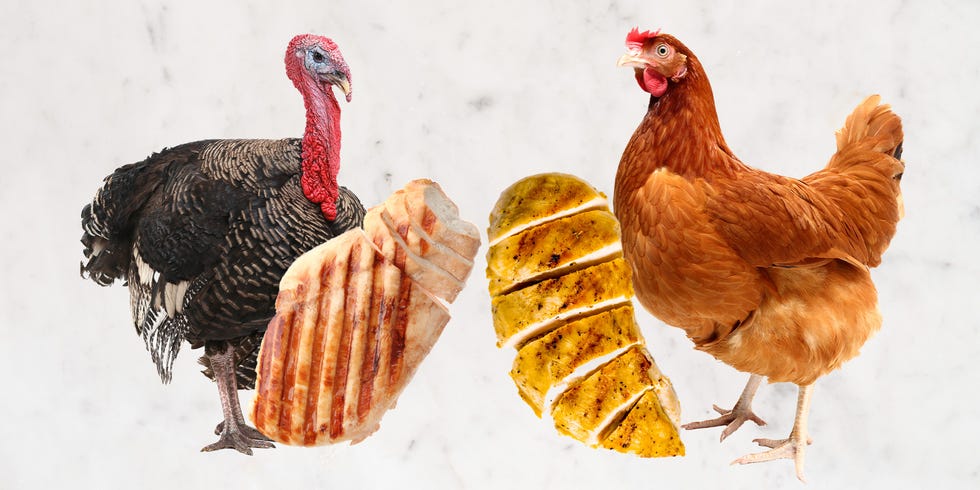Chicken vs. turkey: it’s the ultimate bird debate. They are two of the most common and affordable protein options at the store. And while chicken is more popular in general, as we head into the holidays, it’s officially turkey’s time to shine. So maybe you’re wondering how it compares to chicken in terms of nutrition.
Both chicken and turkey are known for having protein and other health benefits. As for which is “healthier”…well, the word “healthy” means something different for everyone. “One person’s idea of healthy might be totally different from another’s and can depend on their own goals, health conditions, and lifestyle choices,” said Lauren Manaker, MS, RDN, LD.
Among people who eat meat, most of us have a favorite between chicken and turkey. But which is better for you? We asked experts to settle the nutrition debate once and for all.
What does “healthy” even mean?
This is a complicated question. “The idea of what makes food ‘healthy’ varies from person to person, making it quite a personal concept,” said Manaker. “For some folks, healthy eating could mean going for a plant-based diet, while others might focus on meals packed with protein to build muscle. Factors like age, gender, socioeconomic status, perceptions, and even where someone lives can shape their view of health.”
Manaker also shared that in some cultures, a healthy meal is based on nutrient-rich, high-calorie foods, while others believe it’s a meal that consists of fewer calories. Therefore, “healthy” is based on your own preferences and goals. I would be lying if I said that over the years my definition of “healthy eating” hasn’t changed—and as a matter of fact, it’s still changing.
Which is healthier, chicken or turkey?
It’s all about how the dish is prepared and which pieces you’re eating. Chicken and turkey have tender parts of their body, resulting in some areas being leaner than others. But all things considered, turkey breast is considered to be leaner than chicken breast.
“Generally, turkey is considered to have a slight edge over chicken in terms of being leaner, particularly if you choose white meat. Turkey breast, for example, tends to be lower in calories and fat than chicken breast, making it an attractive option for those prioritizing weight management and heart health,” said Manaker.
But she clarified that the difference is slight, and both turkey and chicken are reliable sources of protein, vitamins, and minerals. Manaker stressed that both can be healthy choices, and when it comes to choosing a “healthier” meat, the key is not the bird itself, but rather how it is cooked and the portion size.
“The goal is simply the appropriate amount of proteins in grams that helps one lose weight and maintain weight loss. Simple ways to cut down extra calories without compromising the amount of daily intake of good lean proteins are cooking methods and removing skin to decrease unnecessary calories,” said nutritionist Dr. Amy Lee.
Which has more protein and calories?
When it comes to protein and calories, chicken and turkey are fairly comparable. “No matter which you choose, four ounces of chicken or turkey consist of about 30 grams of pure protein. If you eat the dark meat, then the fat content may be higher compared to the white meat in both poultry,” Dr. Lee said.
What’s the healthiest way to cook turkey and chicken?
You’ve probably heard of “good fats” and “bad fats.” For instance, chicken or turkey that is oven baked allows the meat to soak in its own natural oils, resulting in “good fats.” A piece of chicken that is deep-fried in oil and battered with flour or breadcrumbs produces “bad fat.”
“One of my favorite ways to cook chicken is simply grilling it with the skin on so the natural fats and oils can flavor the meat along with some spices,” Dr. Lee said.
“To achieve the best protein-to-calorie ratio with turkey, opt for roasting or baking turkey breast without the skin,” Manaker said. “This preparation method ensures that turkey maintains its nutritional benefits without unnecessary fats. Gravies and sugary cranberry sauces, while delish, can add extra calories and other factors that don’t support our health.”

Tori Polizzotto is an executive assistant & writer at Hearst Magazines. She grew up in NYC as a competitive dancer and later graduated with a B.S. in Fashion Media from the Laboratory Institute of Merchandising. Tori still remembers the first time she ever read a magazine, and how it sparked her love for journalism. When she’s not writing, she’s usually falling down a TikTok rabbit hole, eating pizza, and binging reruns of Sex & The City. Follow her on Instagram!


